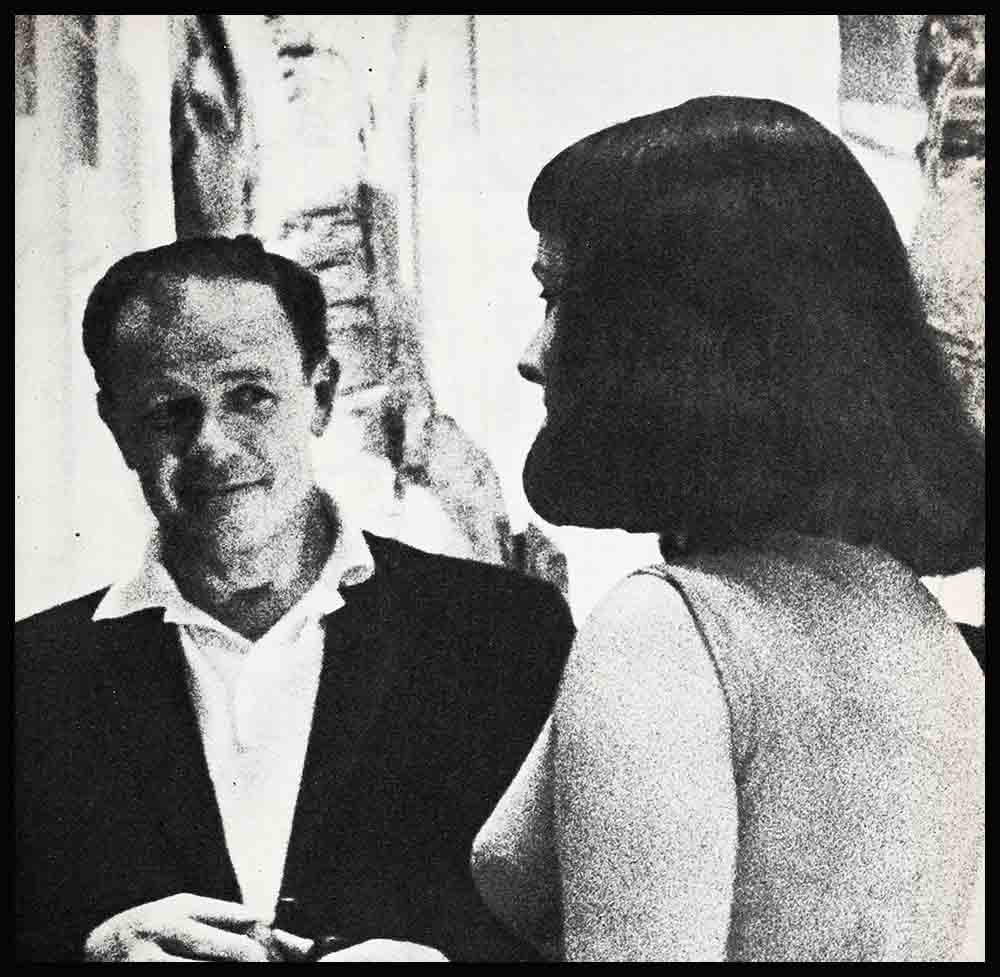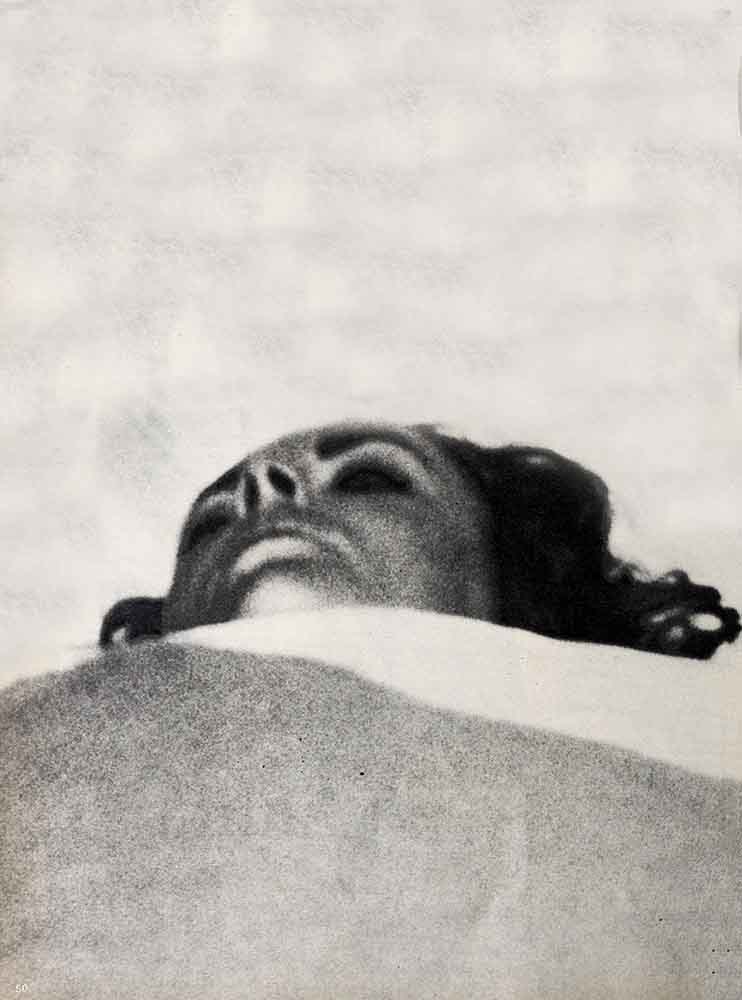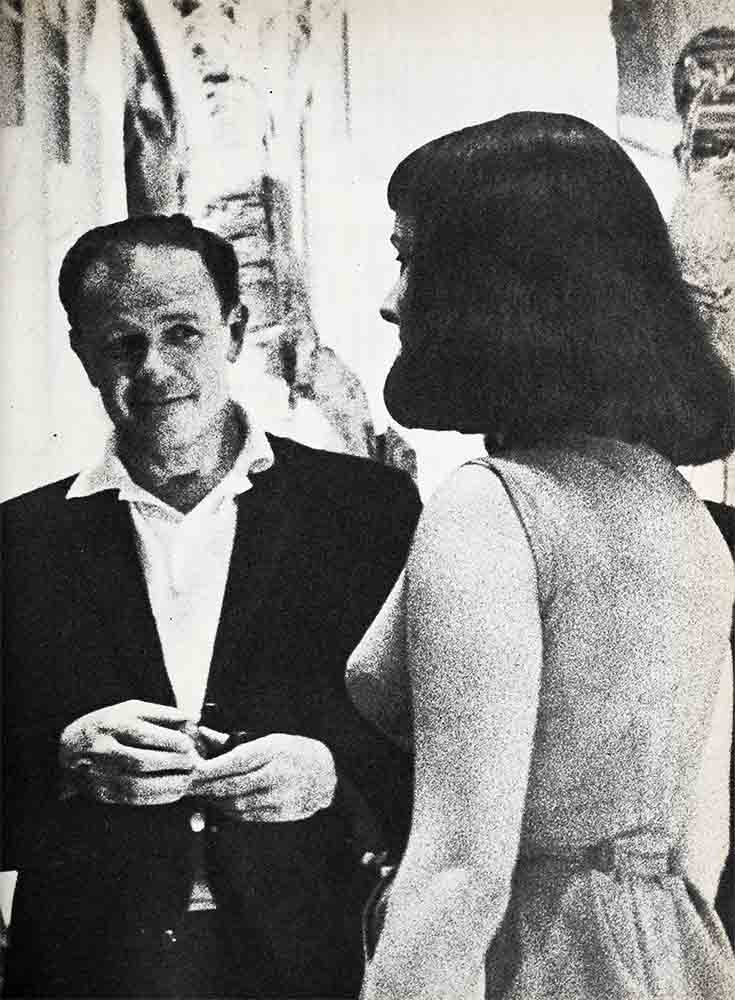
Liz Taylor & Eddie Fisher Separation
Liz Taylor lay on a stretcher, her violet eyes staring sightlessly at the ceiling of the ambulance, a grey blanket covering her motionless body. Her face was a grim, colorless visage that hid the inner torment and pain she was suffering. The scene was like a replay from an old, familiar script which had its first major run in London last year. They rushed her to a hospital in an ambulance then, too, and no one can forget how close to death she came then in her brave battle against double pneumonia. Now, once again, Liz was being rushed by ambulance to a hospital. Now, once again, the desperate moments of uncertainty, the terrible fear and anxiety, the dreadful and haunting specter of Liz Taylor ill again.
The locale this time was not London, but Rome.
The illness this time was not double pneumonia. This time, the official diagnosis was “food poisoning.”
As the first bulletins of Liz’ terrible new plight were flashed around the world, a burning question flamed up in millions of minds: Where was Eddie Fisher?
On the ambulance ride to the hospital in London last year, Eddie was at Liz’ side, comforting her, whispering his love, muttering assurances that she would be all right. Now, on this day of February 17, 1962, as the ambulance raced to the Salvator Mundi Hospital in Rome, the only company Liz had on the ride was the ambulance attendant and the low, moaning whine of the siren.
Eddie wasn’t with Liz to murmur words of comfort, to give her strength in her moment of need, to call upon her courage to stand up again against the cruel blows of adversity as she had done so many times in the past. Eddie and Liz were separated. Separated by many miles of beautiful. blue Mediterranean waters. Liz was in Rome, Eddie in Lisbon.
Why?
That was what everyone asked when the news of Liz’ new siege of illness became known. Why had Eddie gone to Lisbon?
Many reasons were offered. One columnist wrote:
“Eddie Fisher’s reason for being in Portugal when Elizabeth Taylor was stricken with her mysterious ailment was to meet his long-time friend and manager, Milton Blackstone, who flew from New York to Lisbon . . . to give him advice. Milton had no desire to become involved in the Elizabeth-Eddie marital problems, but he couldn’t say no to Eddie’s pleas for moral support. He also was glad to escape the many friends and reporters who wanted information about their so-called ‘rift.’ ”
The same columnist also posed a dynamite-laden question to her readers:
“Who ordered the ‘Cleopatra’ set barred to everybody while Elizabeth and Richard Burton were playing their torrid love scenes for the cameras? Could it have been Walter Wanger?
“At any rate, the edict caused Eddie to storm off to Switzerland and leave his wife to those dangerous high-calorie lunches.”
Of course, the columnist was referring to the numerous reports of poisoned food that had made Liz sick while lunching with Wanger, the producer of “Cleopatra.” The luncheon was in the early afternoon of February 17th, at Liz’ sumptuous $3.000-a-month rented villa on the Appian Way, just outside Rome.
Eddie, true enough, wasn’t present for this now-famous repast. He couldn’t have been if he was in Lisbon. And it was lucky for him that he wasn’t, because one of the entrees evidently was spoiled enough to make Liz and Wanger both ill. This was what caused Liz to go to the hospital—without Eddie.
The physician who treated Liz, Dr. Richard Pennington, said oysters were at the bottom of the trouble. It was suggested that they came from polluted waters and affected Liz so severely that her blood pressure dropped to eighty, causing her to collapse.
When someone asked Dr. Pennington why Liz had to be rushed to the hospital if it was merely a case of food poisoning. he retorted:
“There are some people who don’t know exactly what they’re saying. Perhaps there was excessive precaution because the food poisoning could have been cured very well at home. But given the previous illness of Miss Taylor, stricken some time ago by pneumonia and subsequently undergoing a tracheotomy (opening of the throat and inserting a tube to permit her to breathe), there was a certain amount of concern. . . . Miss Taylor’s illness is a minor one which had to be faced in a rather dramatic way because of her past history. No doctor would ever like to take the slightest risk with a patient who was so close to going to a better world so recently. . . .”
Dr. Pennington was referring to the stories that purported to tell the “real reason” for Liz’ sudden hospitalization, all of which helped to create an uncertainty.
The first account was the most alarming, and it came shortly after Liz was carried on the stretcher into the Salvator Mundi Hospital. It told of the word “paralysis” appearing on the log of the Italian Red Cross motor pool, which had sent the ambulance for Liz. It said, further, that Liz had suffered a throat hemorrhage. This immediately led to speculation that the disorder was related to the tracheotomy which had left the area around the throat somewhat weakened—a condition that could persist for some time before the tissues regained their normal “tone.”
But this was not the cause of Liz’ emergency confinement to the hospital any more than any of the other wild and spectacular reasons bandied about in those first, uncertain hours.
Some rumors purported that Liz was pregnant and that she had suffered a miscarriage. One wild rumor even had her trying suicide.
When Dr. Pennington set the record straight about Liz’ illness, that it was food poisoning, many suggestions as to the kind of food responsible for the illness were hinted at—even though the physician had made it clear that oysters were the cause.
Conflicting reports
Richard Hanley, Liz’ secretary, wouldn’t even accept the doctor’s word. He pooh-poohed the food poisoning report and said that “Liz is simply exhausted. She has been working steadily for five months and is merely tired out.”
One report indicated Liz—and Wanger —became ill after eating “boiled beans.”
Those were the rumors—here is the truth. Yes, Eddie had left Liz.
But not for reasons advanced by the columnist. Because to all appearances, Eddie was not angry with Liz over the torrid love scenes she had played with Richard Burton before the cameras. Eddie had left Rome the week before to stay at his villa in Gstaad, Switzerland, for a brief rest before flying to Lisbon for a hectic round of television appearances and talks with Milton Blackstone about some video shows on an American network in the spring and early summer.
So, on to another confused area:
Was there a ban on the “Cleopatra” set during the so-called “torrid” love scenes between Cleopatra and Marc Antony, as played by Liz and Richard Burton? Primarily, it is important to recognize that a producer, like Wanger, does not concern himself with piddling details like screening visitors to a movie set. Any such order, if issued, would have come from the director. In this case, Joe Mankiewicz. He would exercise sole discretion as to who would be allowed to sit or stand on the sidelines during shooting.
Did Mankiewicz, then, order Eddie barred from the set?
A 20th Century-Fox spokesman, who has been in on every filming sequence of “Cleopatra” since the cameras first started to roll on the epic extravaganza, told Photoplay:
“We have occasionally kept visitors, including newspapermen and photographers, from the set because we didn’t want production held up by possible interruptions, which are bound to occur when people are around. God only knows the picture has suffered enough delays and we’re already $25,000,000 in the hole. We can’t afford many more delays. But there is no order—and never has been any—barring Eddie Fisher from the set. He has been free to come and go as he pleases when Liz and Burton go through their love sequences. And I might add, he enjoyed it.”
That’s what the man from 20th said! But those in the know insist that—not too long before the whole thing blew up— there was such an order barring Eddie from the set, and that the order did come from Mankiewicz.
Of course, the scenes evoked considerable comment because Liz Taylor had played her roles to the hilt. She always does, whether she is portraying Gloria Wandrous, the scarlet woman in “Butterfield 8,” which won her the Oscar last year, or Paul Newman’s sexy wife, Maggie, in “Cat on a Hot Tin Roof.” Or Cleopatra.
How else can a scene be played, but realistically? Did anyone expect Liz to play the role half-heartedly and then hang signs at the box offices saying, “Sorry, I couldn’t kiss Marc Antony with all my soul because I’m a married woman and my husband, Eddie Fisher, would feel offended.”
Ridiculous? Sure. But some stars kiss whole-heartedly without setting off a whole battery of separation rumors.
Enter Richard Burton
But here were simmering rumors that flooded Rome and burst into headline-making stories around the globe in faster time than it took Lieutenant Colonel John H. Glenn to circle the earth in his orbital flight. The headlines involved not only Liz and Eddie, but Richard Burton, as well.
At the time the stories began to make their rounds, Burton, curiously enough, was not in Rome but in Paris. He had gone there during a respite in “Cleopatra” to shoot interior sequences for another film, “The Longest Day,” in which he was starring. . . . And according to him, it was a mere coincidence that he happened to return to Rome on the same day that Eddie returned from Lisbon to be at his ailing wife’s side. Burton, of course, knew about Liz’ illness before he arrived in Rome.
“Wanger had phoned me in Paris Sunday morning that Elizabeth was ill,” Burton said. “But he told me it was nothing serious. The fact that I flew back immediately was merely coincidental. I was due to return then because I was finished with my work in Paris and had to resume with production on ‘Cleopatra.’ ”
At first, however. Burton maintained stiff silence against a front of reporters’ persistent inquiries. He had but one thing to say to all the questions: “No comment.” He wanted to find out first what the stories circulating about him and Liz amounted to.
He also wanted to talk with his wife, who was in New York visiting his stepfather.
When he got to his hotel, Burton found his press agent, Chris Hofer, in a State of high excitement. Hofer brought Burton up to date.
“I’m being sent mad by the rumors about you and Liz being in love,” Hofer told Burton.
“That’s bloody nonsense,” Richard replied. “I don’t think the rumors deserve the dignity of a reply.”
What else was discussed between Burton and Hofer wasn’t made too clear, but the next day Hofer called the Rome scribes and issued a typewritten “Open Letter to the Press,” which he said was prepared at his client’s direction. Here is how it read: “For the past several days, uncontrolled rumors have been growing about Elizabeth and myself. Statements attributed to me have been distorted out of proportion and a series of coincidences has lent plausibility to a situation which has become dangerous to Elizabeth.
“Mr. Fisher, who has business interests of his own, merely went out of town to attend to them for a few days.
“My foster father, Shil Burton. has been quite ill in New York, and my wife Sybil flew there to be with him for a time since my schedule does not permit me to be there. He is very dear to both of us.
“Elizabeth and I have been close friends for over twelve years. I have known her since she was a child star and would certainly never do anything to hurt her personally or professionally.
“In answer to these rumors, my normal inclination would he simply to say no comment. But I feel that in this case things should be explained to protect Elizabeth.”
No sooner was the statement released than Burton promptly denied he had ever authored—or even authorized—it. Certainly that raised instantaneous doubts as to Burton’s real intent. Also, a report from New York indicated that Shil Burton was not ill—and that Sybil had flown to New York to discuss some “personal” matters with him.
Did it mean, the question was asked, that Burton was in love with Liz and wanted the rumors to continue so the stage would be set for an eventual announcement to that effect?
Or, as Hofer later said—after Burton fired him—was it “outside pressure brought to hear upon Mr. Burton” after the statement was released? Hofer did not spell out what that “outside pressure” was.
Hofer told his friends, then the press, that he had expected to be the “fail guy.”
“I stand by the statement I issued under Mr. Burton’s name,” Hofer declared. “The statement was released after a personal consultation with my client.”
So much for the “bloody nonsense,” as Burton called the mass of rumors and misinformation concerning him and Liz.
What of Eddie Fisher? How did he take it? What did he have to say?
On his arrival at the Rome airport, he was met by Wanger. who quickly filled in Eddie on what had happened—a full explanation about the poisoned oysters. Eddie was heard to say to Wanger:
“I’m surprised Elizabeth would fail victim to bad oysters. She’s an expert on sea food. I wouldn’t think she’d be taken in by a single bad oyster.”
Wanger explained that he, too, is a connoisseur of sea food, but he never detected anything wrong with the oysters until suddenly, Liz turned white.
Wanger, who said he’d become slightly ill himself, called to Richard Hanley, who was in the villa. They carried Liz upstairs to her bedroom and called the doctor. When the symptoms were explained—nausea, vomiting and severe abdominal pains—the doctor ordered Liz brought to the hospital. He didn’t want to take any chances.
By the time the Red Cross ambulance arrived, Liz was just about unconscious.
“She was as pale as a sheet,” the ambulance driver, Paolo Renzini, said. “I thought she was ready to go. When I sat in the ambulance beside her, her eyes were open but they were blank. She was staring into space. I was very frightened.”
Wanger and Hanley were also deeply concerned. Hanley called Fisher at his hotel in Lisbon to tell him about Liz. Liz had asked Hanley to call. She wanted Eddie at her side in this new crisis.
After helping the attendant carry Liz in the stretcher to the ambulance, Wanger and Hanley followed to the hospital in Wanger’s car. It wasn’t until after Dr. Pennington took over at the hospital and had given Liz a stomach pumping that the fears for her safety subsided.
“She’ll be all right,” was the reassuring word from Dr. Pennington to Wanger and Hanley. “But I recommend she be allowed to rest for several hours. I allowed Miss Taylor to talk with her husband, who just telephoned from Lisbon. He’s flying back. But remind him the ban on visitors continues. I have asked him kindly not to come to the hospital. Miss Taylor needs rest.”
When Eddie got off the plane, he rushed over to the hospital anyway. And whether it was by doctor’s orders—or Liz’ orders, as some wags have hinted—he cooled his heels for seven hours waiting to see his wife. When he was finally admitted to her room, his visit lasted but an hour. No one knows what Liz and Eddie discussed during that brief hour. But this is known: Eddie came out of the hospital and ran into a battery of curious reporters who swarmed over him and plied him with queries about “the rumors.”
“I’ve got nothing to say,” Eddie said curtly. and walked to a waiting car. Photographers pursued him and his secretary Bob Abrams, snapping photos like mad. Eddie was caught with his face a mask of gloom.
The truth of the matter was, he had nothing to smile about. With every minute, every hour, the rumors grew.
The very next day, Monday, Eddie came back to the hospital. Liz had recovered and was ready to be discharged—though Eddie had reportedly urged her to remain an extra day or so. But Liz, never one to loll around a hospital, left.
Photographers and reporters were waiting for them—anxious to record the swiftly-moving events. Liz, dressed in a black sheath, a loose-fitting leopard coat with matching shoes, barely smiled. Eddie didn’t smile either. The photos taken of them in the car showed Eddie, who usually beams at his bride, glowering!
Back at the villa, the photographers begged for photos. Liz came just outside the front door, posed for a while, then went inside without a word. Eddie didn’t show at all!
When Liz closed the door behind her, she closed it on reporters and photographers. But she didn’t—she couldn’t—close it on the rumors. They will persist no matter how hard anyone—Liz, Eddie, Burton or anyone else—tries to stop them. And what is the unhappy result? It’s this: For the first time since their wedding, the glittering, shimmering, sparkling love affair of Liz Taylor and Eddie Fisher has been tarnished.
—GEORGE CARPOZI
It is a quote. PHOTOPLAY MAGAZINE MAY 1962






